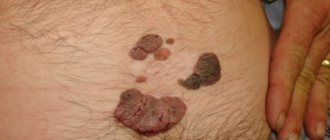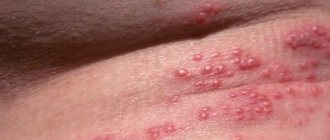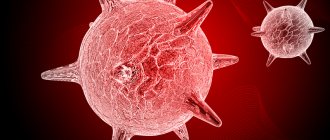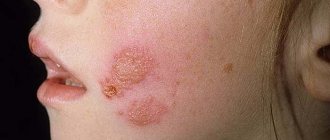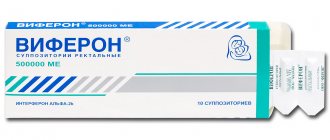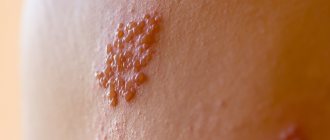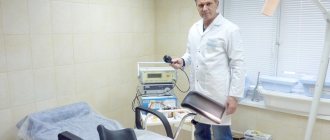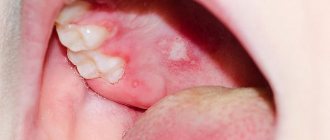Why is genital herpes dangerous during pregnancy?
Answer:
The answer to this question could be a topic for a separate article. It is believed that herpes infection can be the cause of non-developing pregnancy in 20 percent, secondary infertility in 60 percent, and miscarriage in 20 percent of cases.
In addition, the herpes simplex virus can be transmitted vertically - from mother to child, and the likelihood of transmission increases sharply if there are rashes on the mother's genitals during childbirth. With such an infection, the virus can “doze off” for a long time in the child’s body, or can cause herpes of the newborn, isolated as a separate form of infection. This disease can affect a variety of organs of the child, often leading to developmental disorders and sometimes death. Therefore, it is extremely important for expectant mothers to be examined for herpes infection and, if necessary, undergo a course of treatment to prevent exacerbations.
Many-sided, insidious
The properties of HSV are such that almost all human organs can be involved in the infectious process, which allows us to speak of herpes as a “herpetic disease” with a predominant lesion of one or another organ system. For example, the eyes, ENT organs (pharynx, larynx, ear), lungs, genitals, gastrointestinal tract, central nervous system (meninges, nerves), skin and mucous membranes (face, lips, oral mucosa) may be affected. ) etc.
The frequency and intensity of exacerbations of recurrent herpes depend on the activity (aggressiveness) of the pathogen, as well as on the resistance of the human body.
Exacerbations of herpes infection are not always accompanied by the appearance of typical rashes in the form of blisters. The insidiousness of herpes lies in the fact that very often a person, without knowing it, becomes a source of infection for others. This applies to both facial herpes and genital herpes, which often manifests itself only in severe pain (in the facial area or in the pelvis, respectively).
When herpes worsens (when rashes appear), the patient becomes acutely contagious. Kissing a loved one or relative during an exacerbation can lead to the appearance of herpes in a previously healthy person. In addition, under unfavorable circumstances and failure to comply with personal hygiene rules, conditions for self-infection may arise. Thus, the virus can be carried from a lesion on the lips by hands into the eyes and genitals. In the presence of microtraumas in these areas, new foci of the disease arise: ocular herpes or genital herpes.
Genital herpes
Genital herpes (GG) is one of the most common infections of the genitourinary system, most often caused by HSV-11. Infection occurs through close physical contact with a patient or virus carrier during genital, oral-genital, genitorectal and oral-anal contact. There are primary and recurrent genital herpes.
With primary genital herpes, the incubation period (the period from infection to the appearance of the first symptoms of infection) is 1-10 days and differs from subsequent relapses in a more severe and prolonged course. Clinical symptoms of primary HH develop in only 10% of infected people and are characterized by the appearance on the mucous membranes of the genital organs and adjacent areas of the skin of single erosions or grouped small blisters filled with liquid, with redness around them. After 2-4 days, the contents of the blisters become cloudy, and they burst, forming weeping ulcers, which then heal. Subjectively, patients are bothered by itching, burning, and pain in the affected area. Some patients experience an increase in body temperature up to 38°C and a painful enlargement of the inguinal lymph nodes. If the course of the disease is favorable, after 5-7 days the crusts disappear and a stain remains in their place. Even without treatment, symptoms usually go away on their own within 2-3 weeks. Subsequently, for many, the disease recurs, and the time until the next relapse can range from several weeks to several years.
Recurrent genital herpes is characterized by a chronic course, disruption of the patient’s sexual and reproductive functions. The disease is difficult to treat. Herpetic rashes can appear on the labia majora and minora, vaginal mucosa, cervix, and perineum. The duration of the rash does not exceed 3-5 days. In some cases, during a relapse, visible rashes are not detected at all, but swelling, itching, and a feeling of discomfort in the genital area appear. The disease may be accompanied by fever, general weakness and malaise, enlargement and tenderness of the inguinal lymph nodes (usually on one side).
A feature of genital herpes is multifocality: the pathological process often involves the lower part of the urethra (urethra, bladder, which is manifested by pain and pain at the beginning of urination, frequent urination) and the mucous membrane of the rectum (recurrent cracks occur), as well as the upper parts of the genital tract (uterus, ovaries and fallopian tubes). In the latter case, the appearance of mucous discharge from the vagina, periodic pain in the pelvis, in the area of the projection of the uterus, ovaries (symptoms of irritation of the pelvic nerve plexus) are possible. Moreover, these symptoms are often associated with a certain phase of the menstrual cycle (with ovulation or the perimenstrual period). It is not uncommon that the viral nature of the disease is not recognized, and patients are treated for a long time by gynecologists with antibacterial and antifungal drugs to no avail.
What and how is genital herpes treated?
Answer:
Treatment of this infection, like other diseases, should begin with a consultation with a doctor - only a specialist can make the correct diagnosis, assess the condition of a particular patient and choose treatment, taking into account contraindications and side effects of medications.
In recent years, therapy for infections of the reproductive system is almost impossible without the prescription of drugs that increase the body’s own defenses, that is, stimulate the immune system.
The most studied and well-proven immunostimulant in clinical practice is the original domestic drug Cycloferon . Its active ingredient is methylglucamine acridone acetate (a soluble synthetic analogue of the alkaloid of the Citrus grandis
) – stimulates the body’s production of its own interferons, thereby enhancing the nonspecific immune response and reducing the susceptibility of cells to the virus.
In the treatment of genital herpes, the best effect is achieved by combining the use of Cycloferon tablets orally and applying Cycloferon liniment (liquid ointment) locally to the area of the rash. In addition to methylglucamine acridone acetate, liniment contains the antiseptic benzalkonium, which prevents the complication of herpes by a secondary purulent bacterial infection.
The decision to prescribe Cycloferon should be made by a doctor
, however, the lack of toxicity and allergenicity allows you to use the prescribed drug independently. Since Cycloferon is compatible with all medications, it can be used as part of complex therapy.
Diagnostics
If you suspect the presence of herpes simplex, you should not self-medicate. It is urgent, without delay or masking the rash, to come to an appointment with a dermatovenerologist. A carefully collected anamnesis (questioning of the patient) is important for establishing the correct diagnosis. Herpes, regardless of the location of the pathological process, is characterized by a wave-like course, when painful states are replaced by periods of well-being, even without treatment. The presence of blistering rashes on the skin and mucous membranes, severe subjective symptoms (itching, burning) allows doctors to visually diagnose herpes simplex, prescribe treatment in a timely manner and inform the patient about the danger of infecting a sexual partner.
Only laboratory research methods, which are fundamentally divided into two groups, can reliably confirm the herpetic nature of the disease in the absence of typical manifestations on the skin and mucous membranes:
- isolation and identification of HSV from infected material (material for analysis are scrapings from the lesion, blood, urine, saliva, tear fluid, cerebrospinal fluid, discharge of the cervical canal, vagina, urethra, rectum);
- detection of specific antibodies (protective proteins) to the herpes virus in blood serum - serodiagnosis.
How to protect yourself from illness
To avoid catching herpes from kissing, you just need to avoid close contact with sick people who have obvious signs of this disease. Additionally, it is recommended to follow other rules for preventing infection:
- do not use other people’s things (dishes, cosmetics, linen, clothes);
- do not give your things to strangers;
- do not touch the body, especially the face, with dirty hands;
- avoid unprotected and casual sex;
- strengthen immunity;
- use antiseptics after public toilets.
Don't be afraid of herpes. Almost the entire population of the planet is infected with the infection, so it can only be avoided if you completely protect yourself from the outside world. It’s better to simply strengthen your immune system - this is the most reliable protection against frequent relapses and complications.
Isolation and identification of HSV
In specialized virology laboratories, HSV is isolated using the culture method. Its essence lies in the fact that the material for research (the contents of herpetic eruptions, human secretions) is placed on specially grown cells in which the virus begins to multiply. Then, after 5 days, the presence of HSV is determined by characteristic changes. Thus, we can say for sure that this disease is of a herpetic nature.
To identify the causative agent of HSV, the polymerase chain reaction (PCR) method is widely used, which makes it possible to find out what type of herpes virus is present in the body. The material for research is taken with a special brush from the rash sites. The PNR method is highly sensitive and is performed within 24–48 hours.
How often can herpes on the lips reactivate?
Relapses with type 1 HSV infection occur earlier and more often than with type 2 HSV infection. Lip herpes in 25% of adults has regular relapses 1–2 times a year, and in 5–10% of adults there can be up to six relapses per year. Relapses of the disease can occur with varying frequencies. The appearance of herpetic lesions no more than 4 times a year is regarded as a favorable prognostic sign, especially if the rashes appear in the same place and are moderately expressed. Relapses that occur more often than once every 3 months, monthly or every 2 weeks indicate a significant defect in the immune system, which requires additional examination of the patient. In some patients, a continuous course of the disease is possible, when old elements have not yet resolved, but new ones are already appearing.
The frequency of recurrence of herpes on the lips in men and women is the same.
Persistent herpes on the lips (often recurrent) leads to the development of secondary immunodeficiency, manifested in frequent colds, disruption of general condition, decreased performance, the appearance of low-grade body temperature, lymphadenopathy, and psychoasthenia. Often recurrent herpes on the lips is often the cause of neuropsychiatric disorders.
Recurrent herpes on the lips is accompanied by the risk of:
- Infection of children, sexual partners, others;
- Infection of other areas (eyes, genitals, mucous membranes);
- Long-term persistence of symptoms (up to several months) in persons with reduced immunity;
- The appearance of several lesions;
- Attachment of a secondary bacterial infection.
Infectious mononucleosis
This sore throat-like disease, which is caused by human herpesvirus type 4 or Epstein-Barr, is transmitted by airborne droplets, most often through saliva. This herpes is transmitted through a kiss, which is why infectious mononucleosis is called the “kissing disease.”
Is it possible to kiss with herpes (type 4)? If your throat hurts, then it’s better not to
Despite the fact that about 40% become infected with the Epstein-Bar virus in kindergarten and primary school, the clinical picture of the disease: damage to the pharynx, an increase in the size of the lymph nodes, liver and spleen, manifests itself in adolescence and junior age. The vast majority of people by the age of 35 have strong immunity to this herpesvirus, and relapses of the disease are possible only in those infected with HIV.
Is it possible to become infected with genital herpes in a bathhouse or swimming pool?
Outside the human body and at very high temperatures, the virus will not survive in the environment.
Therefore, infection with a virus in a bathhouse is very rare.
But still, it happens, this is possible when using someone else's towel that has viruses on it.
The owner of the towel must have an active infection.
The same applies to the pool; infection is possible, but it occurs extremely rarely.
Advice for patients in the active stage of infection: do not visit public places.
Do not be afraid of contracting any infections.
If you follow the rules of hygiene and use your personal accessories, there is practically no risk of infection.
Causes of herpes
Herpes simplex virus type 1 (HSV-1) can be transmitted through household contact. Airborne transmission is also possible.
The airborne route is the main route of infection with the varicella zoster virus.
Genital herpes and cytomegalovirus are transmitted sexually.
You can also become infected with herpes through blood or saliva. The virus can be transmitted through saliva through kissing. Small children who put things in their mouths every now and then are also very vulnerable. If at least one child in a children's group is infected, a rapid spread of the infection can be expected.
Why both partners need to treat genital herpes
One partner may have persistent manifestations of the disease.
Another may be a carrier.
To avoid constant relapses of the disease, both partners should receive treatment.
A complete cure is impossible.
Once infection occurs, the virus remains in the body forever.
It is imperative to receive treatment in order to:
- no active infection has developed
- there were no constant relapses
- do not infect the fetus if pregnancy is planned
This virus is extremely dangerous for a child who is in utero.
How does recurrent herpes on the lips manifest?
Recurrent herpes on the lips is recorded in 50-70% of patients who previously suffered from an asymptomatic or clinically pronounced primary form of the disease. Relapse is the repeated appearance of typical rashes in the same place - at the site of primary infection (“Locus minoris”).
Fact The state of immunity determines the likelihood of development and severity of the disease, the frequency of subsequent relapses of herpes on the lips.
Factors contributing to the development of relapse are:
- hypothermia, overheating, hyperinsolation (including in a solarium),
- neuro-emotional stress,
- medical and cosmetic procedures (tattoo), surgical operations,
- somatic, endocrine, oncological, infectious diseases (frequent ARVI),
- hormonal changes
- decreased immunity, primary or acquired (secondary),
- poor nutrition,
- long-term use of medications (hormones, chemotherapy, antibiotics, including antivirals, cytostatics),
- active sexual life (for example, with frequent changes of sexual partners or orogenital contacts).
Herpes on the lips manifests itself symptomatically during relapses. Relapse of the disease occurs against the background of circulating antiviral antibodies and therefore proceeds more easily compared to primary herpes. Subjective sensations and intoxication may be mild or absent altogether.
Fact The clinical picture of recurrent herpes on the lips resembles that of primary herpes.
The duration of relapse is less than the duration of primary herpes on the lips and is 7–10 days.
It should be noted that along with the typical manifestation, herpes on the lips can be asymptomatic, with symptoms that go unnoticed, as well as atypical or abortive.
Atypical forms of herpes on the lips may be caused by a change in the development cycle of herpetic elements in the lesion. In atypical forms of recurrent herpes on the lips, as a rule, one of the stages of development of the process in the lesion (erythema, formation of single or multiple blisters) or one of the components of inflammation (swelling, hemorrhage, necrosis) or subjective symptoms (itching) predominates. For example, the edematous form of herpes on the lips differs from the typical form by a sharp swelling of the subcutaneous tissue and hyperemia of the skin (usually on the lips); vesicles may be completely absent.
The hemorrhagic form of herpes on the lips is characterized by the appearance of blisters not with transparent, but hemorrhagic contents, and the subsequent development of ulcerations.
The abortive form of herpes on the lips occurs in patients who have previously received antiviral treatment and/or vaccine therapy. The lesion in an abortive course goes past some of the stages characteristic of the typical form and may appear as an itchy spot or papule.
The subclinical form of recurrent herpes on the lips is detected during a virological examination of sexual partners with any sexually transmitted disease, or during an examination of married couples. Symptoms in this form are mild or completely absent. Patients with a subclinical form of herpes on the lips are a source of infection for their loved ones, children, and sexual partners.
Herpes on the lips. Prevention.
If you have a “cold” on your lips, follow these steps:
healthy lifestyle, giving up bad habits, active sports
systematic and correct use of barrier contraception during orogenital contacts
maintaining personal hygiene
maintaining immunity (avoiding factors that reduce immunity)
treatment of caries, ENT diseases that cause a decrease in local immunity
abstaining from kissing during an active form of the disease or relapse of herpes in the intimate area
timely treatment of herpes on the lips after consultation with specialized specialists (self-medication is not acceptable!).
Briefly about the Vitagerpavac vaccine:
Compound:
— The drug is a lyophilisate for preparing a solution for intradermal administration — Contains specific inactivated antigens of herpes simplex virus types I and II grown on a continuous cell line VERO, acceptable by WHO as a substrate for the production of vaccines
Indications:
- Patients with CGI are subject to vaccination.
- Preparing women with a history of recurrent chronic herpetic infection for pregnancy.
- HIV-infected patients in stages 1-2 of the disease.
Contraindications to the use of the vaccine:
- Active stage of herpes
- Acute infectious and non-infectious diseases
- Chronic diseases in the stage of exacerbation or decompensation
- Malignant neoplasms
- Pregnancy
- Presence of active AIDS symptoms
Vaccination against herpes is carried out in institutions under the supervision of a doctor
- The vaccine is administered in the remission stage 7-10 days after the disappearance of clinical manifestations
- The vaccination course consists of 5 injections with an interval of 7-10 days
- Revaccination - after 6 months
- For complicated herpes, the 2nd and subsequent injections are administered at intervals of 10-14 days - 5 injections. Such patients are recommended to undergo 4 courses of vaccination over 1.5 - 2 years.
Where to get vaccinated Get advice
Detailed information about the Vitagerpavak vaccine and its use can be obtained from the Methodological recommendations MZ3.3.1.0002-10 “Immunization with the Vitagerpavak vaccine (herpetic culture inactivated dry) for the prevention of relapses of infection caused by herpes simplex viruses types 1 and 2”, approved by the Head of the Federal service for supervision in the field of consumer rights protection and human well-being by the Chief State Sanitary Doctor of the Russian Federation G.G. Onishchenko. **** These recommendations came into force in 2010.
*author of the material - Alimbarova L.M. Associate Professor, Ph.D.
Why does herpes appear after kissing and what to do about it
The answer to the question of whether you can get herpes from a kiss is already clear. Not everyone develops an infection after infection. The likelihood of symptoms of a viral disease appearing after a kiss depends on the state of the immune system.
The disease progresses only in a weakened body. A healthy immune system can contain the virus with the help of antibodies, which it produces in response to pathogenic particles entering the body. Relapses are also provoked by the weakness of the protective system. The following can reduce immunity:
- other various chronic infections;
- bad habits (smoking, alcohol, drugs, unhealthy food);
- hidden infections (HIV, hepatitis, early tuberculosis);
- vitamin deficiency due to diets or diseases;
- hormonal imbalances (during pregnancy, age-related, pathological);
- oncological diseases;
- stress, lack of sleep, overwork.
If, after a kiss, an itchy rash in the form of blisters appears on the lips or in other places, you should immediately go to the hospital, get examined and treat the problem. For treatment, antiviral medications based on acyclovir, valacyclovir, famciclovir are used, as well as immune stimulants, vitamins, anti-inflammatory and antihistamines. The rash can be smeared with combination drugs: Bonafton, Viru-merz serol, Panavir, Tebrofen ointment, Depanthenol, Hyporamine, Alpizarin ointment.
